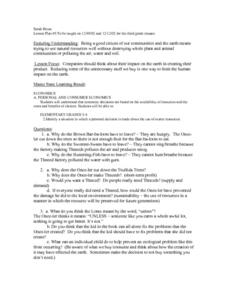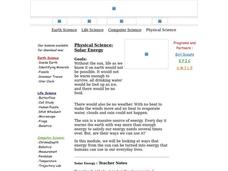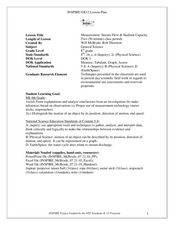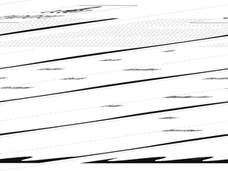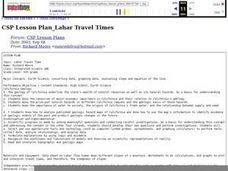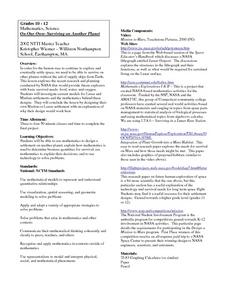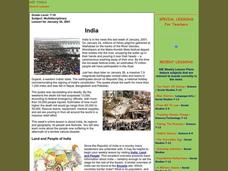Curated OER
Economics -- Third Grade
Third graders read the Dr. Seuss book The Lorax. In groups, they answer questions that are related to economics and distribution of goods. They also identify the environmental issues present in the book and perform a skit in front of the...
Curated OER
Solar Energy
Students investigate solar energy. They explore ways that energy from the sun can be turned into energy that humans can use in our everyday lives. In various experiments, they explore the effect of clouds and dust on photovoltaic energy...
Curated OER
Measurement: Stream Flow & Stadium Capacity
Eighth graders study the scientific fields and how information can be monitored and recorded. In this scientific inquiry lesson students view a PowerPoint presentation and complete a hands on activity.
Curated OER
What is a Karst?
Students examine the process that creates limestone. In this limestone lesson students complete a worksheet and participate in a lab activity.
Curated OER
Sea Connections: Marine Ecosystems
Students identify producers and consumers from marine ecosystems and describe the balance among them in the environments. After constructing a food chain from a marine ecosystem, they examine human activities that can upset the balance...
Curated OER
Photosynthesis: Intake of Carbon Dioxide - Production of Oxygen
Students, after a long-term observation of photosynthesis with aquatic plants, assess the benefits of photosynthesis towards all living organisms. They explain in their own words the two cycles within photosynthesis. Guided discussion...
Curated OER
Making A Compass
This interesting science lesson is about the compass. Students make a compass out of a magnet, sewing needle, cork, and a glass dish. The lesson includes both a pre and post-test for the students to take, and some very good links to...
Curated OER
Energy: Exploring Alternative Forms
In the study of science, there is always
going to be research, data, theories and wonderful new discoveries. I feel that my interest
about energy will help me design an adequate unit full of intrigue and discovery. The
students should...
Curated OER
So Many Inventions!
Students listen to a teacher read aloud of two books about Chinese inventions. They examine some items that were invented by Chinese inventors such as dominoes, an abacus, a silk scarf, or kite. Next, they determine how a compass works...
Curated OER
Lahar Travel Time
Ninth graders analyze published geologic hazard maps of California and comprehend how to use the map's information to identify evidence of geologic events of the past and present and predict geologic changes in the future. They select...
Curated OER
Ocean Currents
Students label the names, relative temperature, distribution, and direction of flow of major ocean currents on a world map. They also explore and model the natural forces that affect the movement of ocean currents through demonstrations...
Curated OER
Cradles of Civilization Information Sheet
In this early civilizations worksheet, students read 4 paragraphs about great river civilizations and then label them Nile, Tigris and Euphrates, Indus, and the Huang He River Civilizations. Student also complete a writing prompt on the...
Curated OER
Human Needs
Middle schoolers investigate human needs and how they have adapted to different environments. They complete an experiment to discover the effect of stress on muscles. They use the food pyramid to create a plan for healthy eating.
Curated OER
Proofreading
In this proofreading activity, students label verbs and subjects and edit paragraphs. Students complete this for 3 paragraphs on this activity.
Curated OER
On Our Own- Surviving on Another Planet
Students investigate current models for Lunar and Martian settlements and study the mathematics behind these designs. They design their own Lunar or Martian settlement with an explanation of why their model would work best.
Curated OER
Can You "Gas" What's Happening?
Students examine gas production in "soil" samples through hands on activities and class discussions, to determine if the soil samples have contain living or non-living systems.
Curated OER
India
Students discuss the land and peoples of India. They examine the effects of the earthquake that occured on the Indian holiday of Republic Day in 2001. They make a list of items they would need in an emergency or natural disaster.
Curated OER
Are Seeds in Danger?
Eighth graders discuss uses and disposal of common household chemicals. They select a household chemical to test for impact on plant germination. Students decide how they want to set up a seed germination project. They design their plan,...
Curated OER
Are Nanobacteria Alive: Sample Socratic Questions
Students comprehend the definition and uniqueness of life and its complexities. They examine what characteristics constitute a living organism. Students recognize the extent of the role nanobacteria play in the movement and molding of...
Curated OER
The Desert Biome
Students create a visual presentation of the characteristics of a biome. Working in small groups, students use traditional and online resources to gather data concerning biomes. Students use their information to create a bulletin board...
Curated OER
Let's Start Growing
Young scholars investigate how a tree grows from a seed. In this plant biology lesson, students use potting soil, tree seeds, and a paper cup to observe seeds growing into plants. Young scholars record observations in their science...
Curated OER
A Reef of Your Own
High schoolers study the reproductive strategies of reef building corals. In this coral reef instructional activity students describe the behaviors of reef building corals and their nutritional strategies.
Curated OER
Think Green
Students experience and practice compositing and recycling through hands-on-activities. They distinguish between which items from their trash can be recycled, composted and reused. The process for making recycled paper is also covered in...
Curated OER
Geology of Yosemite
Students are shown slides of Yosemite and explore how the valley was formed by performing an experiment. Instructions on how to set up the lab are included. They can be assessed orally or by writing a report on the outcome of the lab.
